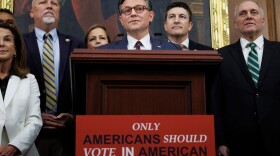Three Democratic congressional representatives are asking state lawmakers to remove a statue of legendary Nevada senator Patrick McCarran from the U.S. Capitol's Statuary Hall, saying he left what they called a "legacy of racism, anti-Semitism, and xenophobia.”
“If you look at the biography of McCarran, you can see that he stood for things that don’t make us very proud as Nevadans,” Rep. Dina Titus (D) -NV., told KNPR's State of Nevada.
UNLV history professor Michael Green said McCarran's views on Jews, communists and immigrants is well documented.
Green said McCarran fought legislation known as the Displaced Persons Act following World War II, because of changes to the law made by McCarran it was almost impossible for Jews to immigrate to the U.S.
“In his mind, Jews and communists were equated," Green said, "It was pretty much the same thing.”
And while other people at the time held anti-Semitic views, McCarran was in a position to make laws based on those views, Green explained.
Titus along with Ruben Kihuen and Jacky Rosen raised their objections tot he statue in a letter to Governor Sandoval and legislative leaders. While the lawmakers in Washington walk by the statue every day, they can't actually remove it. It is up to Nevada lawmakers.
“I see it when I walk through the capital and it just strikes me as this would be an appropriate time,” Titus said.
Titus admits it will be a process to get the statue changed, which is why she wants it on the Legislature's agenda now.
States are allowed two statues in Statuary Hall. The guidelines for who is memorialized in the hall are that the person must be deceased and second that he or she must have done something heroic or made a significant contribution to the state.
Titus suggests someone like former governor Michael O'Callaghan or former governor Grant Sawyer to replace Pat McCarran.
For years, McCarran was the only statute in the hall. The second statue of Paiute leader, author and educator Sarah Winnemucca wasn't placed in the hall until 2005.
Rep. Dina Titus (D) - NV; Michael Green, associate professor of history, UNLV









